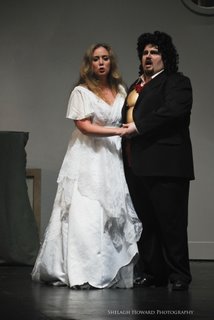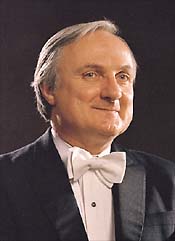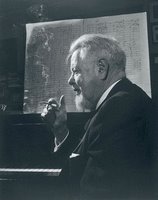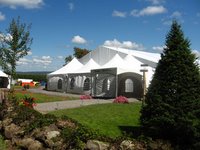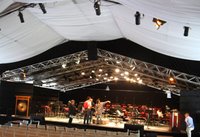The second in a series of reports from Festival Bel Canto 2008 by Paul E. Robinson Although Festival Bel Canto had its official inaugural concert in Knowlton, Quebec on Friday, August 15 with a recital by Jennifer Larmore, one could argue that the real opening came the next night with the Orchestre Symphonique de Montréal (OSM) making its first appearance and with a program that amounted to a virtual bel canto –“Greatest Hits.”
American soprano June Anderson provided star power and was joined by members of the Opera Studio of the Accademia Nazionale di Santa Cecilia in operatic excerpts from works by Donizetti and Rossini. There were copious excerpts from the Barber of Seville by Rossini, and shorter arias, ensembles and overtures from various Donizetti operas including L’elisir d’amore and Lucia di Lammermoor. The best-known piece on the programme was undoubtedly Rossini’s overplayed warhorse, the William Tell overture.
If the idea was to send the audience members away with a smile on their faces and a desire to hear more bel canto then the festival organizers certainly achieved that goal; all the performances were at least competent and some were even memorable. To my taste June Anderson provided the musical highlights beginning with an exquisite ‘Piangete voi…Al dolce guidami’ from Donizetti’s Anna Bolena. The duet with English horn was especially beautiful. Later came an aria from Rossini’s Otello. Verdi’s Otello is, of course the finest opera ever written based on this Shakespeare play but Anderson and Nagano reminded us that parts of Rossini’s Otello are also well worth hearing from time to time. Members of the OSM matched Anderson’s finely-controlled expressiveness with notable obbligato contributions.
Santa Cecilia Academy’s Maestro Carlo Rizzari Shares Podium With Nagano
Kent Nagano, the OSM’s music director, shared the podium with the young Italian conductor Carlo Rizzari. This was another example of the festival’s collaboration between the OSM and the Santa Cecilia Academy in Rome. Rizzari is the assistant conductor of the Orchestra of the Accademia Nazionale di Santa Cecilia, a distinguished and wholly professional ensemble connected with the Academy. Rizzari proved to be highly competent if a little flamboyant in his gestures especially as compared to the austere Nagano. But then Nagano is a special case. Like the legendary Fritz Reiner, Nagano is a minimalist who gets maximum results. More on that subject in a later blog.
The young singers from Italy acquitted themselves well, although I doubt that we were seeing any stars in the making. Although Italy prides itself on being the country that gave birth to bel canto and often suggests that it produces the finest current practitioners, one might justifiably question that claim; Jennifer Larmore and June Anderson are both Americans. That too is a subject for a later blog.
Making Music in a Tent an Acoustical Conundrum
I have now heard two concerts in the Chapiteau Tibbits Hill, the tent especially constructed for Festival Bel Canto 2008, and I can offer at least a preliminary assessment of its acoustics. As one might expect, a canvas tent seating 600 with nothing like a proper shell to reflect sound on the stage is not going to sound like Symphony Hall in Boston or the Musikverein in Vienna. It will not even sound like Place des Arts in Montreal. It is, after all, a small tent. Classical music needs space and it needs reflecting surfaces. For symphony orchestras a big shoebox design usually gets the best results. The size of the tent also forced Nagano to reduce the size of his orchestra to about 50 players. Fortunately, that is about the optimum size for an orchestra specializing in bel canto repertoire.
With all of this in mind Nagano and the festival organizers prepared themselves to improve on nature by bringing along a sound system. All the instruments are miked and a sound engineer at the back of the tent tries to mix the sound as best he can to produce a pleasing effect. At the Friday afternoon dress rehearsal for “Norma”, the result was far from pleasing. In fact, it was harsh and unmusical. But that is why orchestras (and sound engineers) have rehearsals. Last night the sound quality was much improved.
In quiet passages the winds sounded focused and clean. I was reminded of the classic RCA recordings from the 1950s in which wind solos were always prominent and not recessed somewhere at the back of the orchestra. Solo cellos sounded fine too in the beginning of the “William Tell” Overture. When the music got loud, however, the strings virtually disappeared and we were often left with a brass band effect. Unfortunately, this is a criticism often made of the orchestral writing of Bellini and Donizetti at the best of times. The last thing a conductor wants to do is emphasize this quality.
Kent Nagano is a very perceptive musician and no doubt he was very much aware of the problems of making music in a tent. Between the “Norma” rehearsal on Friday and the bel canto highlights concert last night he had obviously had a heart-to-heart with his brass players; they were now playing nearly everything at about half the normal dynamics. Another factor that should be mentioned is that in taking bel canto as his theme for the festival Nagano was interested not only in celebrating the glories of the human voice, but also in learning as much as he could about bel canto orchestral playing. With this in mind he hired violinist Riccardo Minasi, a specialist in early nineteenth-century performance practice, to work with the OSM string players. Minasi was particularly involved in the Norma rehearsals but his approach is probably going to be reflected in every Nagano-conducted performance of music from this period.
Nagano’s new approach undoubtedly means less vibrato and a more sustained and inflected melodic line, analogous to bel canto singing. It also means trying to achieve a much lighter, less Germanic style of orchestral playing.
Lighter, More Authentic Approach Makes a Virtue of Necessity
The best example of what Nagano has achieved so far was on display last night in his conducting of Rossini’s William Tell overture. With modern instruments and the size of today’s orchestras this piece is invariably done today in a “hell for leather” fashion for maximum noise and excitement. But in the early nineteenth century orchestras were much smaller and orchestral instruments capable of producing much more limited volume. The trombones we hear blazing away today in the “Storm” section of the overture had much smaller bores in Rossini’s day and produced a far lighter and more blended sound. Cynics might say that Nagano made a virtue out of necessity by going for a lighter approach last night but in fact his search for a lighter, more authentic bel canto orchestral sound is real. More on this subject after I attend the Norma performance next Sunday.
Incidentally, those attending one of the Norma performances in Knowlton should look in the OSM brass section for another example of Nagano’s search for authenticity. Instead of the usual tuba, you will see a large and strange-looking trombone called a cimbasso; apparently, Bellini called for it in Norma and Verdi was also very fond of it.
Breaking News From Knowlton
At last night’s concert, Marco Genoni, Honorary Chairman of Festival Bel Canto 2008, announced from the stage that the OSM will be performing a free concert in the park in Knowlton on Saturday, August 30. As Mr. Genoni put it, the orchestra “wishes to give something back to the community” in return for its generosity and cooperation in hosting this new festival. Perhaps this was another way of saying that the festival organizers were responding to criticism that most tickets for their concerts were sold out far in advance and few “local” music-lovers had a chance to attend any of the major offerings. If so, credit is due to festival organizers for being sensitive to host community concerns and for acting quickly. > First ReportLabels: Festivals, Montreal, Nagano, opera, voice
